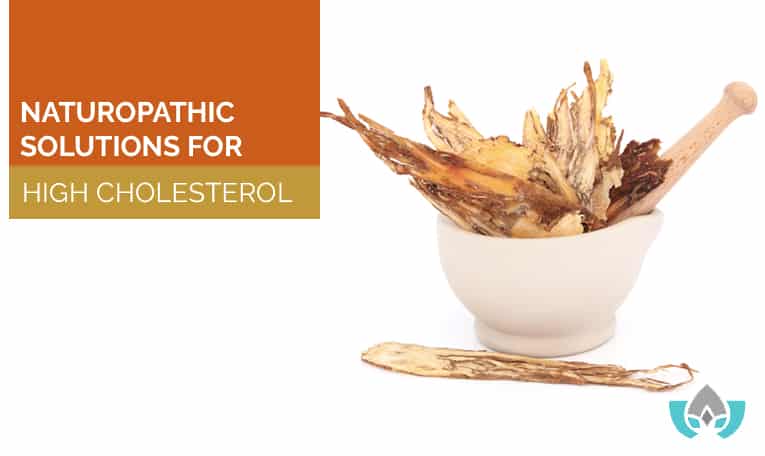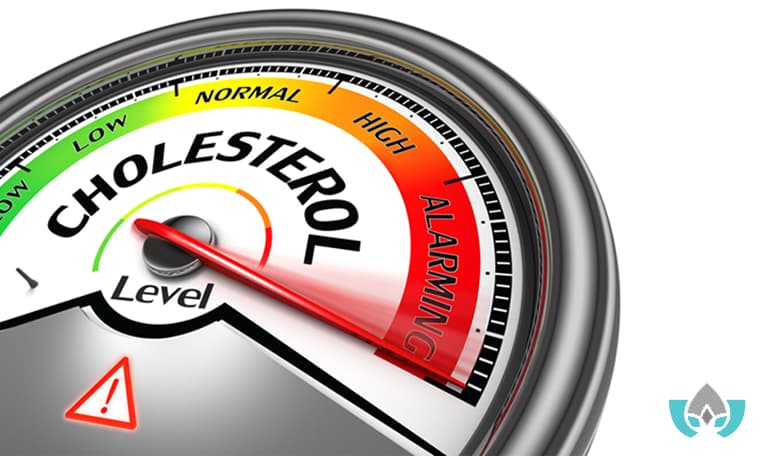
High cholesterol can be a challenge for many people.
It may have potentially deadly consequences if left unchecked, but it is also something that can be lowered naturally through dietary and lifestyle changes.
Working with a naturopathic doctor can be a great asset to help you reach your overall health goals, especially if those goals involve lowering your cholesterol.
Often, naturopathy for high cholesterol and naturopathy for weight loss go hand in hand, so we’ll look at them both here.
Let’s find out more.
What Is Cholesterol
Cholesterol is a fat like substance called a lipid that’s found in a number of food products.
Your liver also naturally produces it.
It plays a key role in the formation of cell membranes, and is the backbone of hormones like vitamin D, and sexual hormones.
Now, the challenge is that cholesterol doesn’t dissolve in water and so it can’t travel through your blood independently.
Lipoproteins, also produced by your liver, help to transport cholesterol through your bloodstream.
There are two major types of lipoproteins: low-density lipoprotein (LDL) and high density lipoprotein (HDL).
Each type carries cholesterol to different parts of your body, which is why they are classified as either ‘good’ or ‘bad’.
What Is LDL Cholesterol?
LDL cholesterol is often called the ‘bad cholesterol’ because, when oxidized, it carries and deposits cholesterol to your arteries.
If you have too much of this, cholesterol can build up on the walls of your arteries.
This build up, often called cholesterol plaque, can narrow your arteries, raise your risk of blood clots, and limit your blood flow causing high blood pressure.
If a blood clot blocks an artery in either your brain or heart, it can cause a heart attack or a stroke.
This is why it’s known as the ‘bad cholesterol’.
What Is HDL Cholesterol?
HDL cholesterol, also called the ‘good cholesterol’ carries the cholesterol back to your liver to be removed from your body.
This includes cholesterol plaque, which is very important to reduce if you have any.
This prevents build ups, especially in your arteries and is why it’s called ‘good cholesterol’ because it lowers your risk for blood clots, heart disease, and strokes.
What Are The Symptoms Of High Cholesterol?
High cholesterol happens when your body carries too much LDL cholesterol.
If left untreated, it can lead to severe health problems including a heart attack or stroke.
The tricky thing with high cholesterol is that there are no symptoms that accompany it.
For this reason, it’s important to get your cholesterol levels checked on a regular basis before a health complication develops.
What Causes High Cholesterol?
High cholesterol is caused by eating too many foods that are high in sugar and refined carbs.
For a long time, it was believed that high fat diets were the main cause of high cholesterol and heart disease.
But plenty of studies have shown that not to be the case.
True, trans fats are still on the naughty list, but other fats, like omega 3 fatty acids, can actually be beneficial.
It might seem obvious – eating foods high in cholesterol would cause you to have higher levels of cholesterol.
But the data just doesn’t show that.
Instead, most cholesterol increases are caused by refined sugars.
In particular, high fructose corn syrup, the cheap sweetener found in sodas, sugary juices, and other processed junk foods.
It’s hard to overstate just how bad refined sugars are for you.
If you’re eating a natural diet, most of the time you’ll be eating sugar accompanied by fruit fibres.
These fibres slow your absorption of sugar, helping you avoid the blood sugar spikes you get after drinking a can of soda.
Without that fibre though, your liver has to find a way to deal with all the sugar you’ve just dumped on it.
And the way it does that is by cranking out LDL cholesterol and lowering HDL cholesterol.
So dietary factors are a major cause, but what else?
Lifestyle factors like smoking and inactivity can also contribute to high cholesterol, along with your genetics.
If high cholesterol runs in your family, you will have a higher risk of developing it.
Type 1 diabetes, type 2 diabetes, and hypothyroidism also can increase your risk of developing high cholesterol.

Health Risks Of High Cholesterol
High cholesterol causes plaque to build up in your arteries, which causes your arteries to narrow over time.
This narrowing limits the flow of blood through your arteries and it raises your risk of developing blood clots, which can lead to serious health complications including:
- Stroke
- High blood pressure
- Chronic kidney disease
- Chest pain
- Peripheral vascular disease
Naturopathic Solutions For High Cholesterol
Now, when people talk about lowering cholesterol, they’re typically talking about lowering your LDL cholesterol – the bad stuff.
So that’s what we’re referring to here.
Thankfully, just as eating foods high in sugar and refined carb can raise your risk of developing high cholesterol, there is a variety of foods that you can eat to combat high cholesterol naturally or in supplement form.
Keep reading to find out more.
1. Eat A Diet High In Healthy Fats
Healthy fats can improve both the type and quantity of cholesterol in your body.
In particular, Omega-3 fatty acids, commonly found in fatty fish like tuna, mackerel, salmon, and lake trout may help to reduce the risk of getting heart disease.
Adding fatty fish to your diet consistently may lower your chances for a heart attack.
Other foods rich in omega-3 fatty acids include walnuts, flax seeds, and soybeans, although your best food source is definitely fatty fish.
Saturated fats, as well, are better for you than we used to think.
Decreasing your intake of saturated fats does lower your cholesterol, but it lowers your HDL – the good stuff – which isn’t really helpful.
Other healthy fats include monounsaturated and polyunsaturated fats.
To increase your intake of healthy fats, include the following in your diet:
- Extra virgin olive oil
- Avocados
- Coconuts
- Walnuts
- Almonds
- Pecans
- Macadamia nuts
- Pumpkin seeds
- Chia seeds
- Sesame seeds
- Hemp seeds
- Flaxseeds
2. Garlic
Garlic is a cooking ingredient that’s also been used as medicine since ancient times.
It can be eaten either raw or cooked, and is also available in supplement form.
Research suggests that garlic may help to reduce your blood cholesterol levels and slow the process of your arteries narrowing due to high cholesterol.
3. Astragalus
Astragalus is a herb often used to strengthen the immune system in traditional Chinese medicine.
It is both anti bacterial and anti inflammatory, and is considered to be an adaptogen, which means that it’s a natural solution for stress.
It may also be good for general heart health, which is a common goal when focusing on lowering your cholesterol.
4. Vitamin B3
Vitamin B3, also called niacin, has been often used as a treatment for people with high cholesterol since the 1950s.
Studies have shown that vitamin B3 was able to significantly lower LDL cholesterol levels and raise HDL cholesterol levels at the same time.
But, because it is only effective in high doses, it should only be used under the supervision of a Mississauga naturopathic doctor.
5. Get A Good Night’s Sleep
It has numerous benefits, including:
- Resetting your central nervous system
- Strengthening your immune system,
- Works as a digestive disorders treatment by balancing hormonal imbalances in your digestive hormones.
- Helps to balance endocrine hormones
- And more
Beyond that, though, it can help to optimize your blood sugar, which is a factor contributing to higher cholesterol.
If you’re struggling with insomnia, speak with an insomnia naturopath.
6. Get More Exercise
Exercise is good for just about every different aspect of your life and health.
Except in extreme cases and particular acute conditions, it’s hard to imagine a situation where a healthcare practitioner of any stripe wouldn’t recommend even mild exercise.
It turns out that among the laundry list of benefits of exercise – to improve mental health, manage stress, and much more – is to help optimize your cholesterol levels.
That exercise doesn’t have to be strenuous though – even going for a walk can make a significant difference.
If you’re more of an athletic type, weight training and HIIT workouts are ideal, but don’t get bogged down in the details.
Any exercise is better than no exercise.
Book Your Appointment With The Mindful Healing Clinic Today
As you can see, there are a variety of naturopathic solutions for high cholesterol.
The best way is to work directly with a naturopathic doctor who can tailor a dietary plan to meet your health goals, including working to lower your cholesterol through diet and lifestyle changes.
Book an appointment today with the Mindful Healing Clinic to find out how we can help.
Until next time,
Dr. Maria Cavallazzi, N.D
Mindful Healing Naturopathic Clinic
Mississauga, ON L5M 1L7
(905) 819-8200
► https://g.page/MindfulClinicNaturopathic
Dr. Maria Cavallazzi is a medical doctor from Colombia where she practiced as a family physician for 8 years until she moved to Canada 16 years ago and became a naturopathic doctor in Mississauga.


